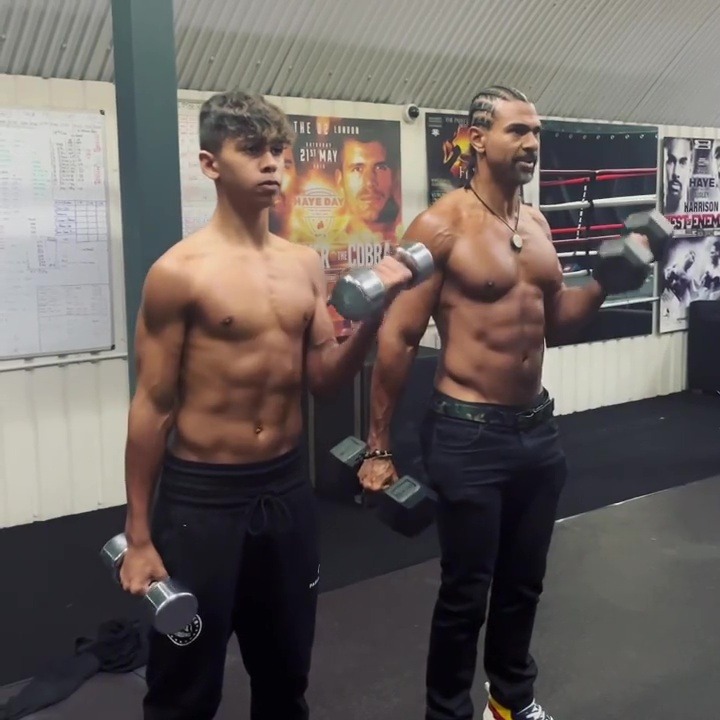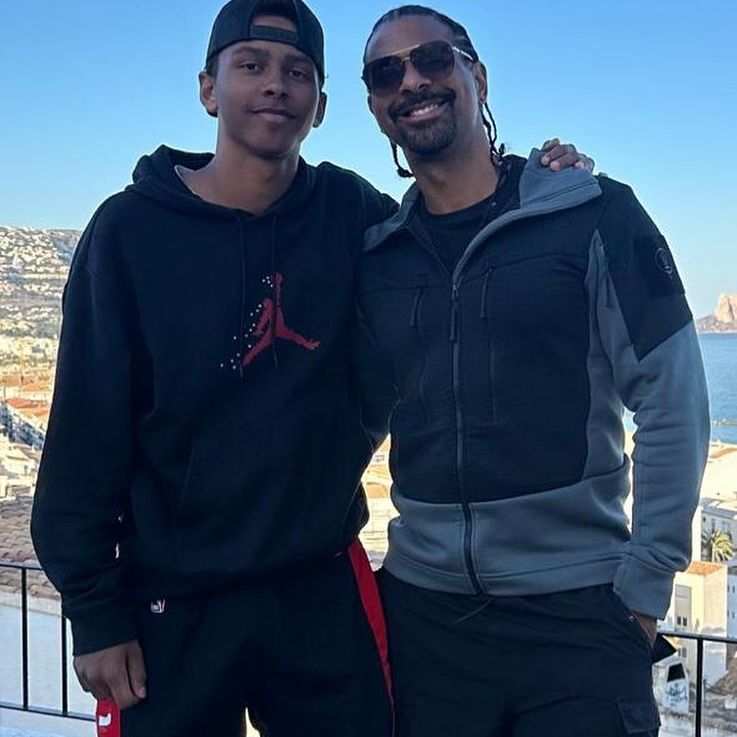Following in His Father's Footsteps
British boxing legend David Haye is known for his remarkable achievements in the ring, having won titles at both cruiserweight and heavyweight. Now, his son Cassius, 15, is carving his own path in a different realm of sports.
A New Chapter in Tennis
Despite being named after boxing icon Muhammad Ali, Cassius is determined to excel in tennis rather than follow in his father's boxing footsteps. David Haye is fully supportive of his son's ambition and is using his own expertise to guide Cassius towards success in the tennis world.
From Boxing Rings to Tennis Courts
Haye, who retired from boxing in 2018, recently took to Instagram to wish Cassius good luck in his tennis career. The father-son duo often work out together, with David sharing his wisdom and experience with Cassius as he pursues his dream of becoming a professional tennis player.
A Tennis Pro in the Making
At just 15, Cassius is already a member of the International Tennis Federation (ITF) and is actively participating in matches to pave the way for his professional tennis career. His dedication to the sport was evident even at a young age, as he attended a tennis training camp at the age of 13 to hone his skills and passion for the game.

Frequently Asked Questions
How important is nutrition to becoming an elite tennis competitor?
Tennis players are not exempt from the importance of nutrition and diet. Dietary intake is important for intensive training because it provides energy, facilitates recovery and reduces the risk of injury. A balanced diet for elite players includes carbohydrates, proteins and fats along with essential vitamins, minerals and nutrients. Maintaining a fluid balance and preventing fatigue is also important.
How important is it for you to compete at junior tournaments if you want a career as a professional tennis player?
Competing in junior tournaments is a crucial step in the journey to a professional tennis career. These tournaments are a great way for young athletes to gain experience playing against others, test their skills, and develop the necessary mental strength to play competitively. Junior tournaments also serve as a stepping stone to higher-level competitions and can significantly impact a player’s ranking, visibility to coaches and sponsors, and their overall development as a player.
What is the age at which a player should begin to train for a shot at professional status?
Starting early in training is an advantage. While there’s no standard age to begin professional tennis, it is a good idea. Many professional players start their training between ages 4-7. Early development is crucial for players to develop a solid base of skills, coordination, and technique. To foster a passion and love of the game, it is important to balance training with normal childhood development.
How can tennis players balance their training with schoolwork?
Balancing academic responsibilities and intense training schedules is a significant challenge for aspiring tennis players. The ability to manage time, prioritize, and create a schedule that works for you is essential. Online schooling and flexible academic programs can help accommodate the demanding training and travel schedule of young athletes. Support from parents, coaches and educational establishments is essential to ensure that players can achieve their goals while maintaining their education.
What role do mental and emotional aspects play in tennis training?
Tennis players need to be trained in mental and emotional training just as much as they do physical training. Players must learn stress management, how to maintain focus and how to deal with emotional highs and lowers during competition. Visualization, goal-setting and mental rehearsals can be common techniques. Working with a sports psychologist can help players build resilience, develop coping strategies for pressure situations, and elevate their mental game to match their physical prowess on the court.
Statistics
- Strength and conditioning coaches emphasize core strength, noting that an increase in core stability can improve shot accuracy by up to 43%.
- Approximately 70% of a professional tennis player’s training time is devoted to developing technique and on-court strategies.
- On average, it’s estimated that only 1 in 5000 high-level junior tennis players will develop into internationally ranked professionals.
- Persistent mental training and sports psychology can help reduce performance anxiety by up to 60%, according to sports psychologists working with elite athletes.
- Statistical trends indicate that top tennis players usually have at least 5 people in their support team, including coaches, fitness trainers, and physiotherapists.
External Links
wilsontennis.com
usta.com
essentialtennis.com
topendsports.com
atptour.com
How To
How to Plan your Nutrition for Tennis Training
Plan your nutrition to maximize your energy and recovery during tennis training. Include whole grains, fruit, and vegetables in your diet to get sustained energy. Lean proteins like fish, chicken and legumes can help with muscle repair. Healthy fats like avocados, nuts, seeds, or sunflowers can help you maintain a healthy body and increase your energy. Drink water all day long, increasing your intake before, during and after practices. Prioritize post-training recovery with a balanced meal or snack within 30 minutes of completing your session to replenish glycogen stores and promote muscle recovery.

